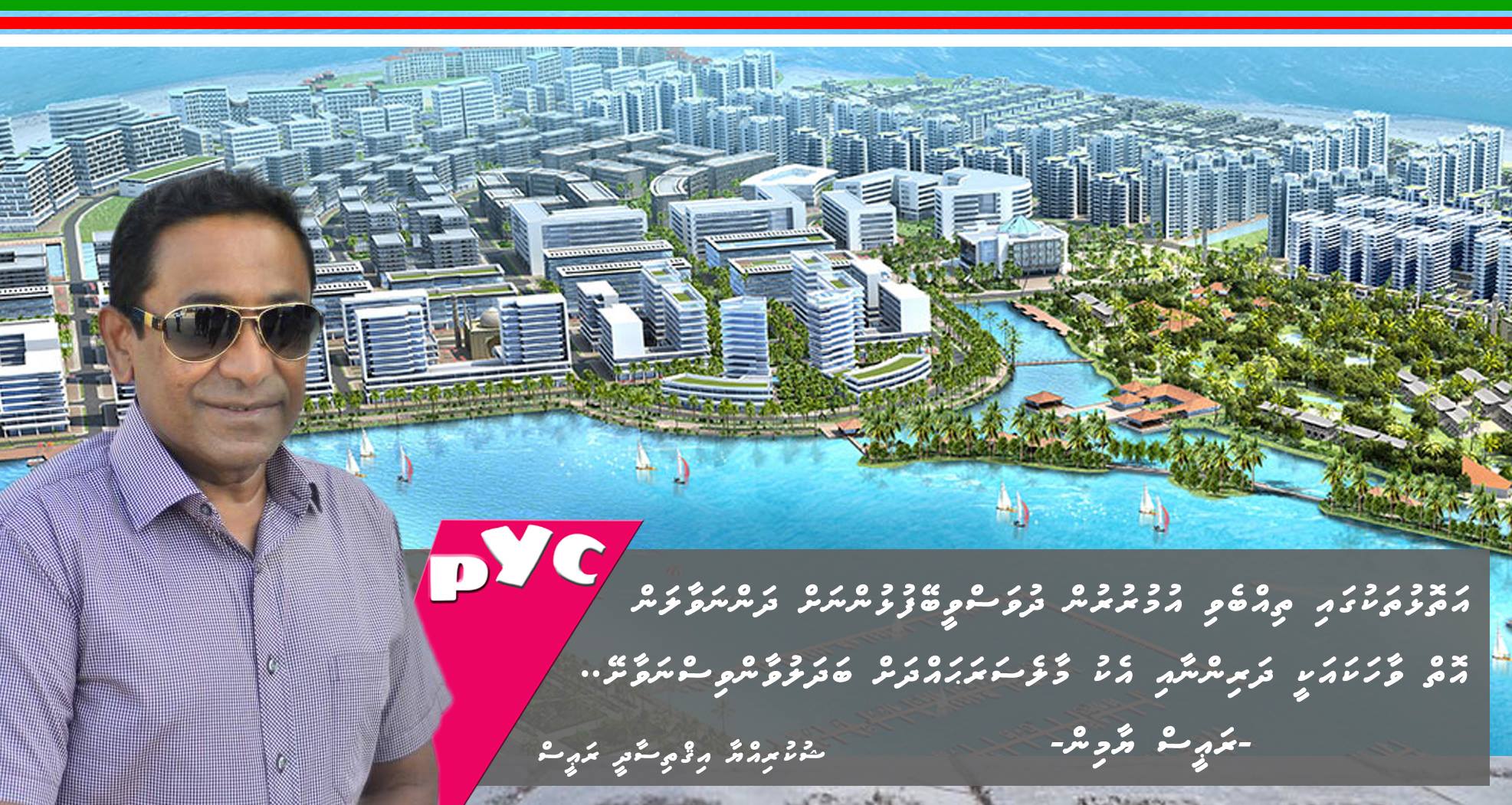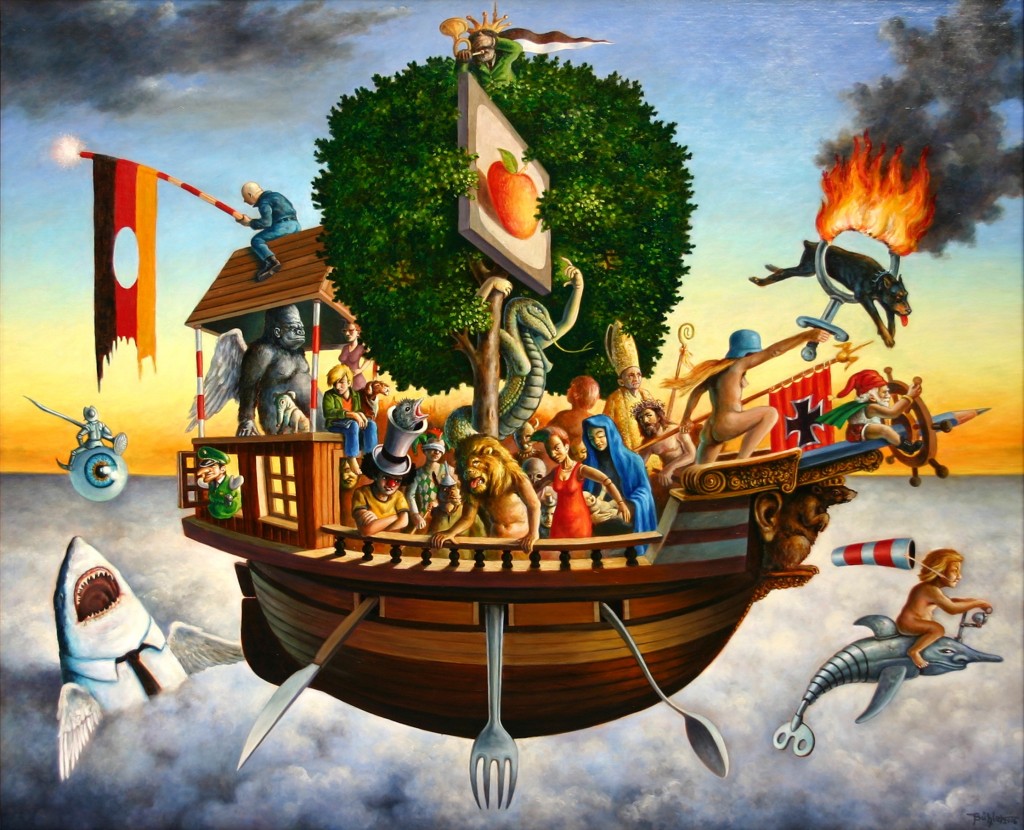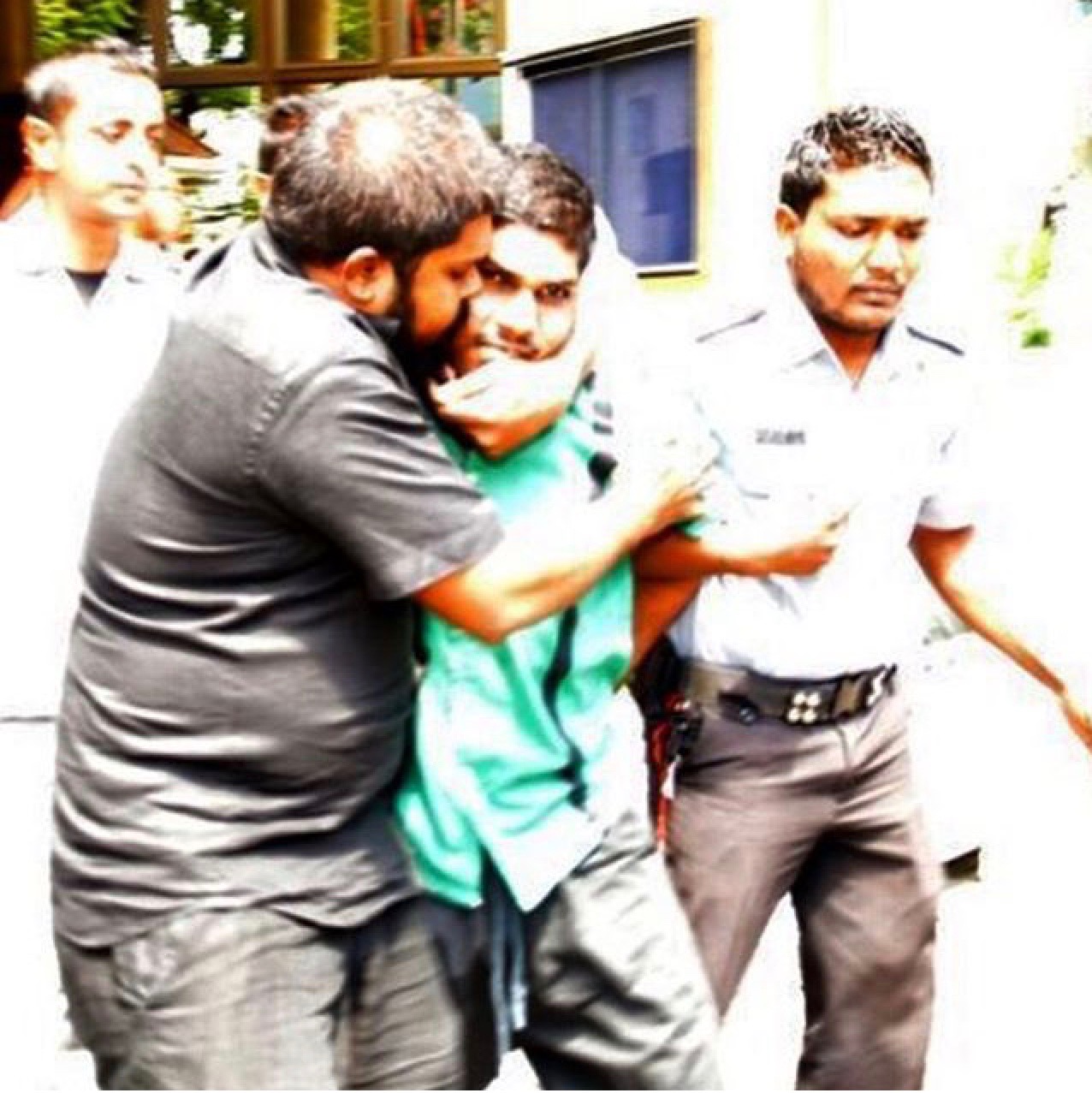Yameen’s(?) Maldives

by Azra Naseem
The Yameen administration is putting in place a governance reform agenda with the help of Singapore’s Lee Kuan Yew School of Public Policy. There is no arguing that Singapore is a successful economy, and a well-ordered society; but a democracy it is not. Yet, although Maldives adopted a Constitution based on democratic values and principles less than a decade ago, it is Lee’s authoritarian capitalism that Yameen wants to practice in the Maldives. How likely is it that he will succeed?
Do I look good in your policies?
‘Singapore owes much of its prosperity to a record of honest and pragmatic government’, wrote The Economist in March 2015 on Lee’s death. Lee’s success in tackling corruption is legendary, and Singapore continues to score among the world’s top ten least corrupt countries. His government ministers were well paid, and he introduced harsh punishments for those who did steal from the public coffers. In sharp contrast, honesty is not in the Yameen government lexicon. While ministerial pay remains comparatively high, there is endemic corruption in the Maldivian government and society. And Yameen, not just his government, is implicated. “When you are handed a huge sum of money, no one would ask where it came from”, Yameen said this year in the aftermath of the worst corruption scandal in the history of the country involving at least US$79 million.
Although it is his own Vice President, under his direct watch, that is said to have masterminded siphoning off of the millions, Yameen has conveniently distanced himself from the whole affair. “The buck stops here”, he said, jailing Vice President Ahmed Adeeb. Apart from keeping Adeeb and associates under lock and key, no action has been taken to recover the lost moneys, or investigate how it was taken. This is a far cry from Lee’s unwavering stand against corruption.
The failure to stem embezzlement and bribery has had negative effects on foreign investment in Maldives. Multiple attempts to attract private foreign investment have resulted in few projects that are transparent, and of obvious benefit to society as a whole. This is the exact opposite of Singapore where foreign investment ‘poured in’ under Lee’s stewardship. Lee hired economic managers that, ‘kept the government small, the economy open and regulation simple, transparent and effective’. And, to attract foreign investment, Lee’s Singapore relied upon massive investments in specialised physical infrastructure, efficient bureaucratic and administrative systems, generous tax incentives to attract capital, and politically docile labour. In Yameen’s Maldives all of these variables are lacking in most areas and non-existent in others.
There is another crucial difference. In Singapore, Lee did not access the funds for its infrastructure through international borrowing or printing money, but through government imposed savings. In the Maldives, Yameen is borrowing like there is no tomorrow.
“I only have two and a half years left,” he said in a recent speech. “Short cuts have to be taken”, he asserts, if he is to undertake massive infrastructure projects—like the development of a new airport. By shortcuts he means loans. A US$800 million loan to develop the airport, he says, is justified. Debt levels are thus skyrocketing, standing at over 80% GDP this year, and forecast to rise up to over 100% of the GDP by 2018.
Added to the corruption and the bad debt scenario, which the World Bank Group sees as unsustainable, is how far the Maldives lags behind Singapore in the world ‘ease of doing business rankings’. Singapore is No.1 out of 189 countries while Maldives at No. 128. In terms of reliability in enforcing contracts, Singapore leads the world once again while the Maldives, with the costly GMR debacle fresh in investor minds, and with its endemic corruption, is at No.95.
With such big shoes to fill, following in Lee’s economic footsteps will be a difficult, if not impossible, task for Yameen.
Bookworms and burger technicians
Yameen also lacks Lee’s vision of education as central to the growth of the nation he wanted to create. Singapore’s National University is among the top 25 in the world, and the country taken pride in having an ‘unabashedly meritocratic’ education system where ‘high quality education is available for all levels of academic aptitude’. Things cannot be more different in the Maldives—high quality education is only available in Male’, the capital. The quest to provide good education to their children is the driving force behind mass migration to Male’ from other islands. Even in Male’, a parallel system of expensive tuition is necessary for children to attain levels of education necessary to gain admittance in universities abroad.
On top of systematic failures in the education sector, Yameen’s personal approach to education is lukewarm. Yameen has moved to reduce importance of academic achievement, decreasing awards for and celebration of high achievers; encouraged vocational training for the ‘not as clever’ majority; and has spoken disdainfully of ‘bookworms’. Lee, on the other hand, is said to have read Lewis Carroll, Jane Austen, and Shakespeare’s sonnets—among others—to his wife when she lay ‘bedridden and mute for two years’ before her death.
Whereas Lee worked hard to make the Singaporean workforce one of the key strengths of the country’s economy, Yameen sees the Maldivian labour force as hopeless, unskilled, and unqualified for the tasks he has in mind for them. He lamented recently that the biggest challenge to running a world-class airport in the Maldives would be having to do so with Maldivian staff.
Significant variables that contributed to Lee’s economic success is thus missing in Yameen’s equation, making it unlikely that the latter can emulate the former in a positive way. Latest World Bank Group report predicts a debt-ridden bleak economic future far removed from Singapore.
Me Yameen, You Lee
This is not to say that Yameen will fail altogether in his mission to mimic Lee. More than a few similarities are already evident in both men’s curtailment of people’s democratic freedoms. Lee locked up members of the opposition to stamp it out, stifled press freedom, and legally hounded critics and opposition politicians, including the foreign press. Lee also arranged the electoral process in such a way as to make it almost inconceivable for his People’s Action Party (PAP) to lose power. In the space of just two and a half years, Yameen has managed to take almost all those steps, and then some, against democratic freedoms. His main project at the moment appears to be emulating Lee’s role as a disciplinarian, the man in charge of creating a politically docile workforce.
Yameen has taken to performing this task like a duck to water. Armed with an award for excellence in governance, and security guards with machine guns, Yameen travels the country to tell people that if they want prosperity ‘like Singapore’, they must accept ‘government knows best’. Not just in terms of economy, but socio-politically as well. People must put aside their fight for civil and political rights, they must demonstrate obedience, be reverent, docile.
Everyone must accept Economies of Scale is king. Bowing to its power, over two thirds of the population must move to what Yameen is calling the Greater Male’ Area—Male’, Villingili, and the artificial island of HulhuMale’—being expanded at breakneck speed with borrowed capital. For a successful economy, Maldivians living on small islands scattered across 90,000 square kilometres of the Indian Ocean must all relocate—willingly, submissively—to living in purpose-built high-rises. It is impossible, Yameen has said, to provide basic services to Maldivians who do not fall in line with the plan.
Yameen’s speeches are often a scolding; full of rebukes and dressing-downs for some wrong committed by an individual or imagined societal groups. ‘Good Maldivians’ are not concerned about assembling freely, press freedom, or any other ‘minor’ civil liberty. Those who speak up for rights are mocked as street performers. When journalists objected to the fast receding press freedoms in April this year, for example, Yameen described them as political activists who had lost all semblance of order. He decries the last decade as one of futile resistance; not for democratic rights but against progress. The agitation for democracy and the short transition period were costly detours on the road to progress. The lesson must be learned from it that fighting for civil and political freedoms will only bring more of the same chaos. Therefore, work with Yameen and his PPM loyalists to make money at any cost, notwithstanding that they may come at the expense of human rights, the environment, and the Maldivian ways of life.
While Yameen may be on the same page as Lee on placing democracy behind economic progress, there are vast differences in how the two leaders persuade their peoples of the suitability of their plans for their countries. Whereas Lee led by example, Yameen leads by fiat. In Singapore, Lee was ‘incorruptible, capable, and completely committed to Singapore’s interests’.
There is a long way to go before Yameen achieves that kind of credibility with the people of Maldives. Almost half the population is vehemently opposed to his rule; he has not proven his capabilities as an economist, nor has he proven himself incorruptible. Given these factors, it is going to be difficult, if not impossible, to cultivate belief among the majority that he is completely committed to Maldives’ interests.
Lee admitted to being Machiavellian in his approach to being loved or feared. “If nobody is afraid of me, I’m meaningless” he said. President Yameen, wants people to fear him—Gatu Raees, President with Guts, PPM supporters call him. A crucial difference remains, though. Whereas Lee was both feared and respected, there is little respect for Yameen among most people. There is fear, and there is intense dislike. Respect, despite legal and administrative demands for it, has not been forthcoming. The question of love is not even entertained—either by people, or by Yameen.
Go boldly forth, to realise someone else’s dreams
Yameen’s vision for the Maldives is problematic in a variety of ways.
Most fundamentally, it is plagiarised; somebody else’s idea for another country. It is not an organic vision shared by, or arrived at through consultation with the Maldivian people about their wants, aspirations and ways of life.
Yameen was not elected to change the system of governance in the Maldives but to govern according to the 2008 Constitution in place for five years when he came to power. As president he has no right to curtail the rights provided by the Constitution, or to deviate from the democratic path.
Under the plan for reform, Yameen is making criticism a crime, is removing all opposition through legal and other means, wants to establish a one party system, and will engineer the electoral system or the voting system in such a way that he will remain in power for a long time to come.
Economic success that line pockets can, as Lee showed in Singapore, be a ‘winning’ strategy if it provides people with opportunities for better lives. Without such success, the politically docile society will remain a pipe dream.
These reasons, and other differences with Singapore that have not been discussed here–such as cultural background, religious controls, intolerance, xenophobia and a foreign policy rapidly moving away from democracies to align with autocracies–make Yameen’s attempts to morph Maldives into Singapore unlikely to succeed.
It is also important to recall here that the ongoing attempt by Yameen to super-impose Lee’s ideas for Singapore in the Maldives is not the first time its been tried. Someone else had this same plan before, and 30 years in which to make it a success:
The government now wants to attract international investment, as it is keen on the concept of profit and is not committed to sociologist ideology. Male’ is a free port, and, inspired by the example of Singapore, the government wants to bring in banking, insurance, ship bunkering and other clean but profitable enterprises. Whether Male’ can fulfil its hopes in this regard is doubtful, for it lacks the economic infrastructure.
That is a description of Maumoon’s government, by Clarence Maloney, at the start of the 1980s. Did we get anywhere near being a Singapore?
Further reading: Fareed Ahmed, 2015, Can Maldives Replicate Singapore Story: A Comparison

